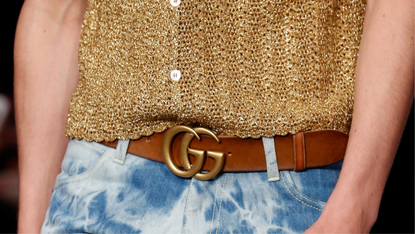Gen Z’s new takedown: the meaning of ‘cheugy’
Outdated tastes and millennial fashions mocked in viral TikTok trend

It is pronounced “chew-gee” and is a term that has found fame through Gen Z’s favourite social media platform, TikTok.
In the broadest sense, cheugy describes items and fashions that are simply out of date. Passe interior design and once-loved clothing staples have fallen victim to the descriptor, along with everything from overused social media captions to high-profile public figures.
Cheugy can describe anything that is untrendy, but is most frequently used to refer to things considered vaguely mainstream in the early Noughties and 2010s - offering a new way for Gen Z to “troll” millennials, reports Vice.
Subscribe to The Week
Escape your echo chamber. Get the facts behind the news, plus analysis from multiple perspectives.

Sign up for The Week's Free Newsletters
From our morning news briefing to a weekly Good News Newsletter, get the best of The Week delivered directly to your inbox.
From our morning news briefing to a weekly Good News Newsletter, get the best of The Week delivered directly to your inbox.
The New York Times (NYT) says the term can be used to describe someone, often a millennial woman, who is “trying too hard”, while the London Evening Standard says to “think Basic Bitch 2.0” to get the idea. The general consensus is that cheugy describes an inoffensive lack of taste.
A 23-year-old software developer is credited by the NYT with coining the term. Gaby Rasson began identifying cheugy trends as a student at Beverly Hills High School in 2013.
The phenomenon seemingly spread through word of mouth among school and college communities until Los Angeles-based copywriter Hallie Cain, 24, posted a TikTok video in March showcasing “the word you never knew you needed” in action.
TikTok posts with the hashtag #Cheugy have since accrued more than 24 million views, and Google searches have gone from non-existent to peak interest in just a matter of weeks. Part of the intrigue surely lies in the difficulty of pinning down exactly what counts as cheugy.
“What is and isn’t cheugy is highly subjective and changing quickly,” notes NYT technology reporter Taylor Lorenz. The term can divide opinions. “I’ll send something to our group chat and be like, ‘Is this cheugy?’ and some will say ‘yes’ and some will say ‘no’,” Cain told the paper.
Cheugy “isn’t meant to be negative”, says the Daily Mail, but others disagree. While it might sound like a light-hearted internet fad, cheugy has been seen as “a reductive, dismissive, or even offensive grouping of people for simply liking what they like”, says Refinery29.
Issues of class have come into the conversation, as well as race. TikTok user Kiera Breaugh sees cheugy as a way for “white women to micromanage what makes other white women cool in a way that women of colour don’t do”.
Identifying cheugy-ness
Even the most on-the-pulse tastemaker is likely to experience an episode of cheugy, which can refer to anything that was in style for millennial teenagers.
Products such as Herbal Essences shampoo have been identified as cheugy, while a framed affirmation of “Live, Laugh, Love” will also earn cheugy-points. If motivational quotes and life goal graphics are frequent additions to your Pinterest boards, you are treading a fine line - particularly if you wear Ugg boots while doing so.
“Girlboss”-emblazoned mugs and stationery have also come under fire in the wake of the cheugy movement, as have “grown adults who still love all things Disney”, says People magazine.
The London London Evening Standard provides a simple and effective litmus test: “If your most-used emoji is the crying laughing one, welcome to Cheugsville, population: You.” That said, you might find yourself hanging out there with Fearne Cotton and Holly Willoughby, who the paper describes as “a bit cheugy” too.
Too cheugy to be cheugy?
So long as something was once widely considered to be in style but now is not, it’s likely to be cheugy. In fact, “it could even be argued that the word ‘cheugy’ has already been so overexposed that it is, itself, cheugy - if it was ever trendy enough in the first place to qualify”, says Refinery29.
Create an account with the same email registered to your subscription to unlock access.
Sign up for Today's Best Articles in your inbox
A free daily email with the biggest news stories of the day – and the best features from TheWeek.com
Julia O'Driscoll is the engagement editor. She covers UK and world news, as well as writing lifestyle and travel features. She regularly appears on “The Week Unwrapped” podcast, and hosted The Week's short-form documentary podcast, “The Overview”. Julia was previously the content and social media editor at sustainability consultancy Eco-Age, where she interviewed prominent voices in sustainable fashion and climate movements. She has a master's in liberal arts from Bristol University, and spent a year studying at Charles University in Prague.
-
 Stay-at-home girlfriends: why Gen Z are rejecting 'girlboss' culture
Stay-at-home girlfriends: why Gen Z are rejecting 'girlboss' cultureWhy Everyone's Talking About 'Soft girl' trend reflects disillusionment with the corporate ladder but has 'huge financial risks'
By Julia O'Driscoll, The Week UK Published
-
 'Applejuiceification': the illusion of choice?
'Applejuiceification': the illusion of choice?Under the Radar Shoppers have been surprised to discover the high percentage of apple juice in many soft drinks and smoothies
By Chas Newkey-Burden, The Week UK Published
-
 A 'deplorable tactic': why film studios are pitting influencers against critics
A 'deplorable tactic': why film studios are pitting influencers against criticsTalking Point Movie bosses are increasingly prioritising 'social sentiment' over newspaper reviews
By Chas Newkey-Burden, The Week UK Published
-
 The Stanley tumbler craze is far more than a viral trend run amok
The Stanley tumbler craze is far more than a viral trend run amokIn The Spotlight The USA is doing what it does best
By Scott Hocker, The Week US Published
-
 The celebrity winners of 2023
The celebrity winners of 2023Why everyone's talking about Girl power's still got it as Taylor Swift, Barbie and Britney all come out on top
By Harriet Marsden, The Week UK Published
-
 2023: the year of nostalgia
2023: the year of nostalgiathe explainer There was something familiar in the air this year
By Theara Coleman, The Week US Published
-
 From 'thunks' to mixed reality, the future of books is interactive
From 'thunks' to mixed reality, the future of books is interactiveThe Explainer What is in store for literature in an increasingly digital world?
By Theara Coleman, The Week US Published
-
 The Marvels flop: end game for superhero box office streak?
The Marvels flop: end game for superhero box office streak?Why everyone's talking about The 33rd film in the Marvel Cinematic Universe earned just $47 million on its opening weekend, prompting claims of 'superhero fatigue'
By Keumars Afifi-Sabet, The Week UK Published

